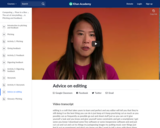
Advice on editing.
- Subject:
- Applied Science
- Arts and Humanities
- Computer Science
- Graphic Arts
- Material Type:
- Lesson
- Provider:
- Khan Academy
- Provider Set:
- Pixar
- Author:
- Disney Pixar
- Khan Academy
- Date Added:
- 07/14/2021

Advice on editing.
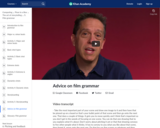
Advice for storytellers.
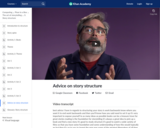
Advice from storytellers on structure.
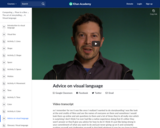
Advice from our storytellers.

This course instructs students on how to develop technologies that help people measure and communicate emotion, that respectfully read and that intelligently respond to emotion, and have internal mechanisms inspired by the useful roles emotions play.
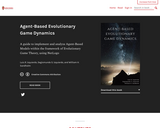
This book is a guide to implement simple agent-based evolutionary models using NetLogo.
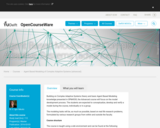
Building on Complex Adaptive Systems theory and basic Agent Based Modeling knowledge presented in SPM4530, the Advanced course will focus on the model development process. The students are expected to conceptualize, develop and verify a model during the course, individually or in a group. The modeling tasks will be, as much as possible, based on real life research problems, formulated by various research groups from within and outside the faculty.
Study Goals The main goal of the course is to learn how to form a modeling question, perform a system decomposition, conceptualize and formalize the system elements, implement and verify the simulation and validate an Agent Based Model of a socio-technical system.

How to combine data from a database using SQL.
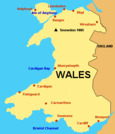
This case study describes the educational use of an open dataset collected as part of a thousand mile research walk. The content connects to many hot topics including quantified self, privacy, biosensing, mobility and the digital divide, so has an immediate interest to students. It includes inter-linkable qualitative and quantitative data, in a variety of specialist and general formats, so offers a variety of technical challenges including visualisation and data mining as well. Finally, it is raw data with all the glitches, gaps and problems attached to this.
The case study draws on experience in two educational settings: the first with a group of computer science and interaction design masters students in class-based discussions run by the first author; the second a computer science bachelor's project supervised by the second author.

This is a research-oriented course on algorithm engineering, which will cover both the theory and practice of algorithms and data structures. Students will learn about models of computation, algorithm design and analysis, and performance engineering of algorithm implementations. We will study the design and implementation of sequential, parallel, cache-efficient, external-memory, and write-efficient algorithms for fundamental problems in computing. Many of the principles of algorithm engineering will be illustrated in the context of parallel algorithms and graph problems.

This course is organized around algorithmic issues that arise in machine learning. Modern machine learning systems are often built on top of algorithms that do not have provable guarantees, and it is the subject of debate when and why they work. In this class, we focus on designing algorithms whose performance we can rigorously analyze for fundamental machine learning problems.

This lesson centers around the How AI Works: Equal Access and Algorithmic Bias video from the How AI Works video series. Watch this video first before exploring the lesson plan.
In this lesson, students will practice cropping images to uncover the bias underlying the Twitter cropping algorithm. Then, students will read and watch a video about the discovery of this biased algorithm. Finally, students will discuss ways to recognize and reduce bias along with analyzing Twitter's response to the allegations of bias in their cropping algorithm.
This lesson can be taught on its own, or as part of a 7-lesson sequence on How AI Works. Duration: 45 minutes

6.890 Algorithmic Lower Bounds: Fun with Hardness Proofs is a class taking a practical approach to proving problems can’t be solved efficiently (in polynomial time and assuming standard complexity-theoretic assumptions like P ≠ NP). The class focuses on reductions and techniques for proving problems are computationally hard for a variety of complexity classes. Along the way, the class will create many interesting gadgets, learn many hardness proof styles, explore the connection between games and computation, survey several important problems and complexity classes, and crush hopes and dreams (for fast optimal solutions).
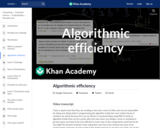
How can we improve the speed of a (deterministic) primality test? Created by Brit Cruise.
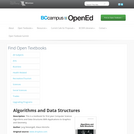
This is a textbook for first year Computer Science. Algorithms and Data Structures With Applications to Graphics and Geometry.
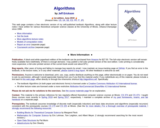
This web page contains a free electronic version of my self-published textbook Algorithms, along with other lecture notes I have written for various theoretical computer science classes at the University of Illinois, Urbana-Champaign

This course is offered to undergraduates and addresses several algorithmic challenges in computational biology. The principles of algorithmic design for biological datasets are studied and existing algorithms analyzed for application to real datasets. Topics covered include: biological sequence analysis, gene identification, regulatory motif discovery, genome assembly, genome duplication and rearrangements, evolutionary theory, clustering algorithms, and scale-free networks.

Animation is a compelling and effective form of expression; it engages viewers and makes difficult concepts easier to grasp. Today’s animation industry creates films, special effects, and games with stunning visual detail and quality. This graduate class will investigate the algorithms that make these animations possible: keyframing, inverse kinematics, physical simulation, optimization, optimal control, motion capture, and data-driven methods. Our study will also reveal the shortcomings of these sophisticated tools. The students will propose improvements and explore new methods for computer animation in semester-long research projects. The course should appeal to both students with general interest in computer graphics and students interested in new applications of machine learning, robotics, biomechanics, physics, applied mathematics and scientific computing.

This is a graduate-level introduction to the principles of statistical inference with probabilistic models defined using graphical representations. The material in this course constitutes a common foundation for work in machine learning, signal processing, artificial intelligence, computer vision, control, and communication. Ultimately, the subject is about teaching you contemporary approaches to, and perspectives on, problems of statistical inference.

Diving into Pool Safety: A STEM Design Challenge using the Micro:bit